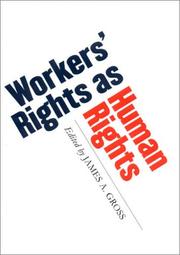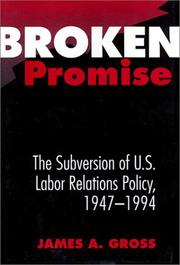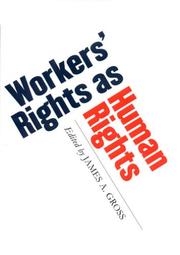| Listing 1 - 10 of 11 | << page >> |
Sort by
|

ISBN: 0801440823 Year: 2003 Publisher: Ithaca : Cornell University Press,
Abstract | Keywords | Export | Availability | Bookmark
 Loading...
Loading...Choose an application
- Reference Manager
- EndNote
- RefWorks (Direct export to RefWorks)
Labor unions --- Labor laws and legislation --- Employee rights --- Syndicalisation --- Travail --- Personnel --- Organizing --- Droit --- Droits
Book
ISBN: 0585105510 9780585105512 1438405146 Year: 1974 Publisher: Albany, N.Y. State University of New York Press
Abstract | Keywords | Export | Availability | Bookmark
 Loading...
Loading...Choose an application
- Reference Manager
- EndNote
- RefWorks (Direct export to RefWorks)
Law - U.S. --- Law, Politics & Government --- Labor Law - U.S. --- United States. --- NLRB --- Labor Board (U.S.) --- Labor Relations Board (U.S.) --- N.L.R.B. --- National Labor Relations Board (U.S.)
Book
ISBN: 9781501714269 1501714260 9781501714276 1501714279 9781501714252 1501714252 9781501714252 Year: 2017 Publisher: Ithaca
Abstract | Keywords | Export | Availability | Bookmark
 Loading...
Loading...Choose an application
- Reference Manager
- EndNote
- RefWorks (Direct export to RefWorks)
This provocative book by the leading historian of the National Labor Relations Board offers a reexamination of the NLRB and the National Labor Relations Act (NLRA) by applying internationally accepted human rights principles as standards for judgment. These new standards challenge every orthodoxy in U.S. labor law and labor relations. James A. Gross argues that the NLRA was and remains at its core a workers' rights statute. Gross shows how value clashes and choices between those who interpret the NLRA as a workers' rights statute and those who contend that the NLRA seeks only a "balance" between the economic interests of labor and management have been major influences in the evolution of the board and the law. Gross contends, contrary to many who would write its obituary, that the NLRA is not dead. Instead he concludes with a call for visionary thinking, which would include, for example, considering the U.S. Constitution as a source of workers' rights. Rights, Not Interests will appeal to labor activists and those who are trying to reform our labor laws as well as scholars and students of management, human resources, and industrial relations.
Labor laws and legislation --- Industrial relations --- Employee rights --- United States. --- NLRB --- Labor Board (U.S.) --- Labor Relations Board (U.S.) --- N.L.R.B. --- National Labor Relations Board (U.S.)

ISBN: 1566393256 Year: 1995 Publisher: Philadelphia (Pa.) : Temple university press,
Abstract | Keywords | Export | Availability | Bookmark
 Loading...
Loading...Choose an application
- Reference Manager
- EndNote
- RefWorks (Direct export to RefWorks)
Industrial relations --- Labor laws and legislation --- Labor policy --- History

ISBN: 9780801472626 Year: 2006 Publisher: Ithaca (N.Y.) ILR Press
Abstract | Keywords | Export | Availability | Bookmark
 Loading...
Loading...Choose an application
- Reference Manager
- EndNote
- RefWorks (Direct export to RefWorks)
Book
ISBN: 1439903700 Year: 1995 Publisher: Philadelphia : Temple University Press,
Abstract | Keywords | Export | Availability | Bookmark
 Loading...
Loading...Choose an application
- Reference Manager
- EndNote
- RefWorks (Direct export to RefWorks)
The Wagner Act of 1935 (later the Wagner-Taft-Hartley Act of 1947) was intended to democratize vast numbers of American workplaces: the federal government was to encourage worker organization and the substitution of collective bargaining for employers' unilateral determination of vital work-place matters. Yet this system of industrial democracy was never realized; the promise was ""broken."" In this rare inside look at the process of government regulation over the last forty-five years, James A. Gross analyzes why the promise of the policy was never fulfilled. Gross looks at how the Nati
Labor policy --- Industrial relations --- Labor laws and legislation --- History
Book
ISBN: 9781501725265 Year: 2018 Publisher: Ithaca, NY
Abstract | Keywords | Export | Availability | Bookmark
 Loading...
Loading...Choose an application
- Reference Manager
- EndNote
- RefWorks (Direct export to RefWorks)
Multi
ISBN: 9781501725265 Year: 2018 Publisher: Ithaca, N.Y. Cornell University Press
Abstract | Keywords | Export | Availability | Bookmark
 Loading...
Loading...Choose an application
- Reference Manager
- EndNote
- RefWorks (Direct export to RefWorks)
Book
ISBN: 0913447986 9780913447987 Year: 2009 Publisher: Champaign Labor and Employment Relations Association
Abstract | Keywords | Export | Availability | Bookmark
 Loading...
Loading...Choose an application
- Reference Manager
- EndNote
- RefWorks (Direct export to RefWorks)
Employee rights. --- Human rights. --- Industrial relations. --- Labor laws and legislation, International. --- Personnel management --- Moral and ethical aspects. --- Human rights --- Industrial relations --- 332.84 --- 332.9 --- 342.7 --- AA / International- internationaal --- US / United States of America - USA - Verenigde Staten - Etats Unis --- Corporations --- Employment management --- Human resource management --- Human resources management --- Manpower utilization --- Personnel administration --- Management --- Public administration --- Employees --- Employment practices liability insurance --- Supervision of employees --- Capital and labor --- Employee-employer relations --- Employer-employee relations --- Labor and capital --- Labor-management relations --- Labor relations --- Basic rights --- Civil rights (International law) --- Rights, Human --- Rights of man --- Human security --- Transitional justice --- Truth commissions --- Moral and ethical aspects --- Moreel en intellectueel leven van de werknemers --- Internationale organisatie, reglementering en wetgeving van de arbeid --- Grondrechten. Politieke rechten. Rechten van de mens. Grondwettelijke vrijheden. Bescherming van de enkeling --- Law and legislation
Book

ISBN: 9781501724244 Year: 2018 Publisher: Ithaca, NY
Abstract | Keywords | Export | Availability | Bookmark
 Loading...
Loading...Choose an application
- Reference Manager
- EndNote
- RefWorks (Direct export to RefWorks)
| Listing 1 - 10 of 11 | << page >> |
Sort by
|

 Search
Search Feedback
Feedback About UniCat
About UniCat  Help
Help News
News